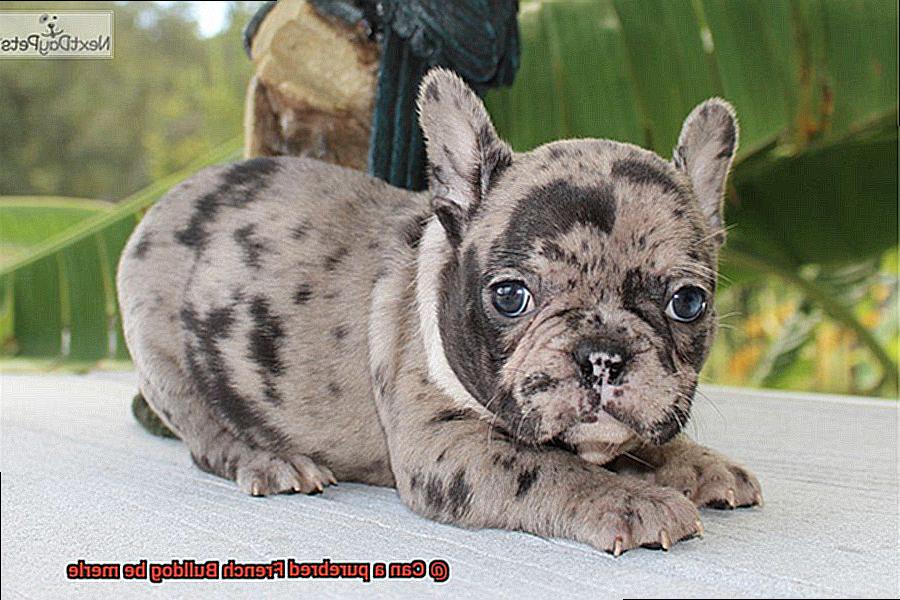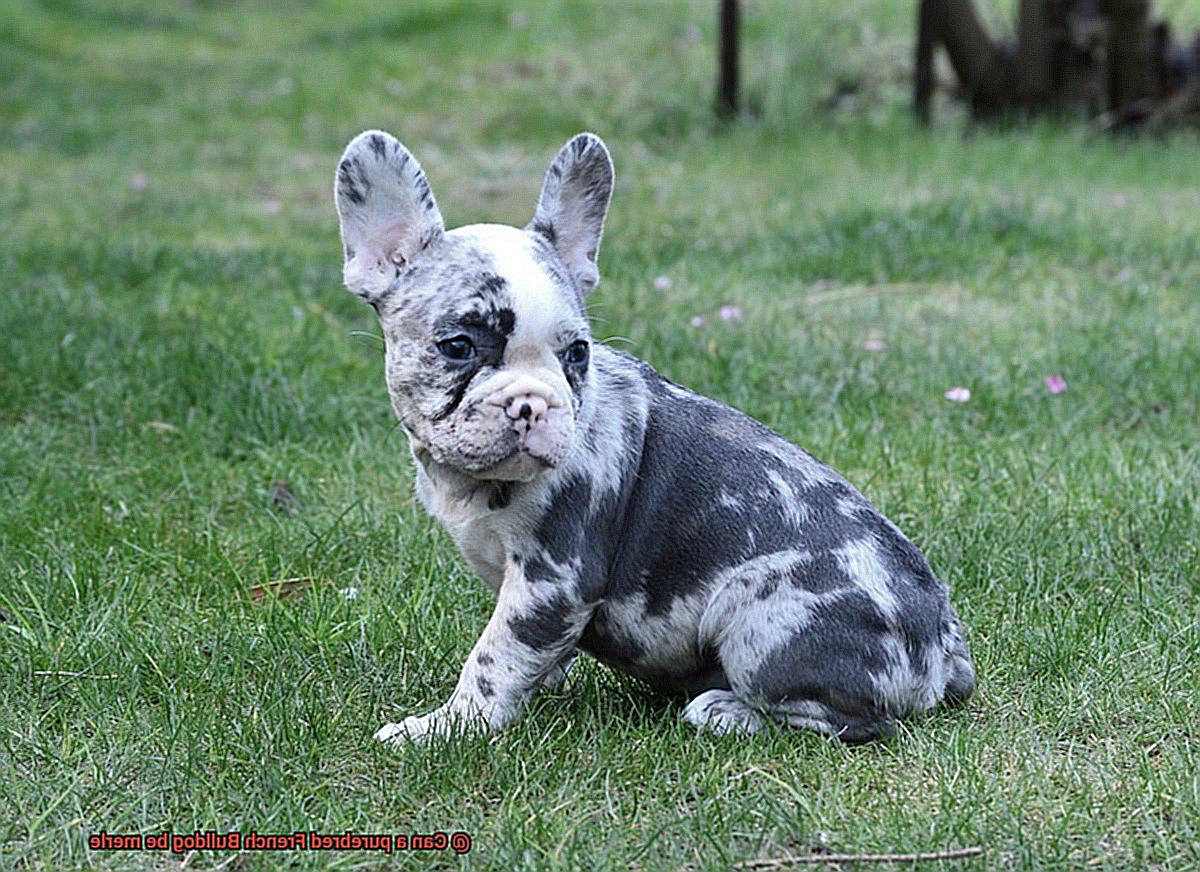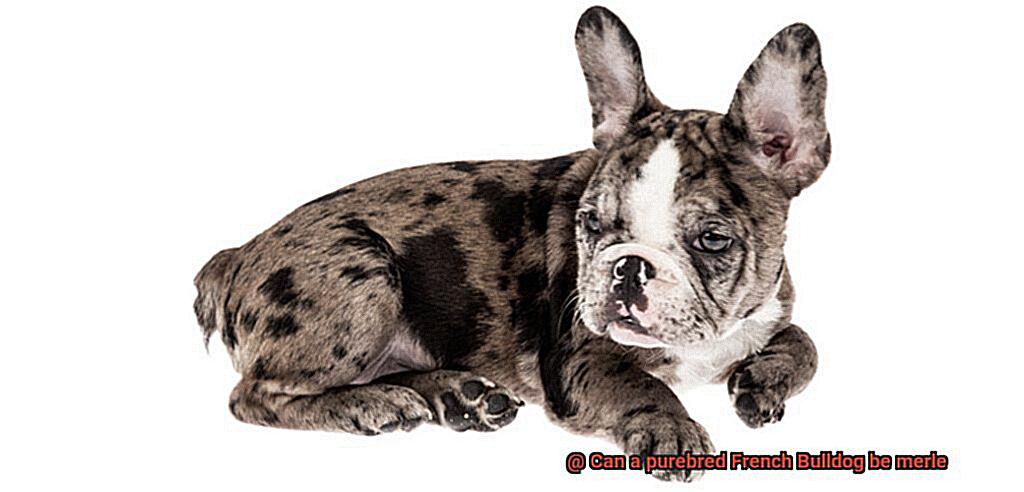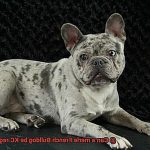Can a purebred French Bulldog be merle?
French Bulldogs have stolen the hearts of dog lovers everywhere with their affectionate personalities, adorable appearance, and playful antics. With their bat-like ears and compact bodies, these canines are undeniably captivating. But there’s one question that has sparked curiosity and debate among enthusiasts – can a purebred French Bulldog have a merle coat pattern?
Merle, a distinctive pattern often associated with breeds like Australian Shepherds and Collies, showcases patches of diluted color on a solid base, creating a mesmerizing mottled effect. But does this rare coat variation truly exist in French Bulldogs?
In this blog post, we embark on an exciting journey to uncover the truth behind merle French Bulldogs. Through expert insights and captivating anecdotes from passionate Frenchie lovers, we aim to separate fact from fiction and shed light on this intriguing topic.
Join us as we dive deep into the world of merle French Bulldogs, dispelling myths and unraveling the enigma surrounding these elusive canines. Get ready to have your questions answered and your curiosity satisfied as we explore whether these delightful creatures are more than just legends.
So sit back, relax, and prepare to embark on an adventure filled with fascinating discoveries. It’s time to unveil the truth behind merle French Bulldogs and settle the debate once and for all.
French Bulldog Breed Standards and Colors
Contents
- 1 French Bulldog Breed Standards and Colors
- 2 Health Issues Associated with the Merle Gene
- 3 Merle-Colored French Bulldogs of Unknown Origin
- 4 The Risks of Purchasing a Merle-Colored French Bulldog
- 5 Responsible Breeding Practices for French Bulldogs
- 6 What to Do if You Own a Merle-Colored French Bulldog
- 7 Conclusion
French Bulldogs are beloved for their unique appearance and charming personalities. If you own a French Bulldog or are considering getting one, it’s essential to understand the breed standards and acceptable colors. In this article, we will delve into the French Bulldog breed standards, explore the accepted colors, and explain why merle is not recognized as an acceptable color.
French Bulldog Breed Standards:
According to the American Kennel Club (AKC) and other reputable canine organizations, French Bulldogs have specific breed standards that define their ideal characteristics. These standards help ensure that purebred French Bulldogs possess the distinctive qualities that make them so beloved.
Accepted Colors:
The AKC recognizes three primary colors for French Bulldogs: brindle, fawn, and white. Brindle refers to a coat pattern with a base color of fawn or cream, overlaid with dark stripes. Fawn can range from a light tan to a darker reddish shade. White is also accepted but should not exceed 10% of the dog’s body.
Why Merle is Not Accepted:
Merle is not considered an acceptable color in French Bulldogs according to breed standards. Merle is a coat pattern characterized by patches or streaks of diluted pigment on a base color. While merle is seen in several dog breeds like Australian Shepherds and Dachshunds, it is not typical in purebred French Bulldogs.
The reason behind this exclusion is the potential health issues associated with the merle gene. Merle can be linked to a higher risk of deafness, eye abnormalities, and other congenital defects. Responsible breeders prioritize the health and well-being of their dogs and avoid breeding merle French Bulldogs to prevent these health concerns.
Beware of Impostors:
It’s worth mentioning that not all dogs with merle-like markings are purebred French Bulldogs. Some unscrupulous breeders may try to pass off mixed-breed dogs or those with an unknown lineage as purebred French Bulldogs. These dogs may exhibit merle-like markings due to the presence of other breeds in their genetic background.
To ensure you are getting a purebred French Bulldog, always work with reputable breeders who provide proper documentation, including pedigrees, to verify the lineage of their dogs. This way, you can be confident that your new furry friend is a true purebred French Bulldog.
Health Issues Associated with the Merle Gene
In this blog post, we will delve into the health issues associated with the merle gene in French Bulldogs. While this gene creates a unique coat pattern, it also brings along potential health concerns that owners should be aware of. Let’s explore these issues in more detail.

Higher Risk of Deafness:
One of the major health issues linked to the merle gene in French Bulldogs is a higher risk of deafness. Merle dogs are more prone to congenital deafness, meaning they are born deaf or have hearing impairments from birth. This can greatly impact their quality of life and require additional care and attention from their owners.
Ocular Abnormalities:
Merle French Bulldogs are also more likely to develop ocular abnormalities. These include conditions such as iris coloboma, which is a malformation of the iris that can affect vision. There may also be a higher risk of other eye problems like cataracts or progressive retinal atrophy.
Skin Problems:
Another health concern associated with the merle gene is skin problems. Areas of unpigmented skin caused by the merle gene are more prone to sunburn and skin cancer. As responsible owners, it is crucial to protect our merle French Bulldogs from excessive sun exposure and apply pet-safe sunscreen when necessary.
Double Merle Health Risks:
Breeding two merle French Bulldogs together can result in even more severe health issues known as “double merle” or “homozygous merle.” Double merle dogs have a higher risk of being born with serious health conditions including deafness, blindness, and other developmental abnormalities. Responsible breeders avoid breeding two merles together to prevent these health risks.

Merle-Colored French Bulldogs of Unknown Origin
The origin and potential risks associated with these unique-colored French Bulldogs remain shrouded in mystery. In this blog post, we will delve into the world of merle-colored French Bulldogs of unknown origin, exploring various theories and shedding light on the risks involved.
The Controversial Origins:
Mixed Breeding Theory:
- Some breeders speculate that merle-colored French Bulldogs are the result of mixed breeding with other merle-carrying breeds like Chihuahuas or Dachshunds.
- This theory suggests that the merle gene may have been introduced through crossbreeding, resulting in the appearance of merle-colored puppies.
Dormant Genes Theory:
- Another theory proposes that merle-colored French Bulldogs may be descendants of dogs with hidden recessive merle genes within the breed.
- It is believed that these genes remained dormant for generations and resurfaced unexpectedly, giving rise to merle-colored puppies.
Responsible Breeding and Health Risks:
Genetic Health Issues:
- Merle gene is associated with an increased risk of hearing and vision impairments in dogs.
- Breeding two merles together can lead to a higher likelihood of offspring suffering from severe health conditions such as deafness and ocular abnormalities.

Ethical Concerns:

- Intentional crossbreeding to produce merle-colored French Bulldogs goes against the breed standard and is considered controversial within responsible breeding communities.
- This practice can introduce health issues associated with the other breeds involved, compromising the overall health and well-being of the dogs.
The Risks of Purchasing a Merle-Colored French Bulldog
Merle-colored French Bulldogs may be captivating to the eye, but behind their mesmerizing coat lies a host of potential risks that potential owners must consider. From health issues to breeding complications, ethical concerns to limited recognition, it’s essential to be well-informed before making the decision to bring one of these dogs into your home.
Health Issues
The merle gene, responsible for the unique coat coloration in these French Bulldogs, is also associated with various health problems. These can include eye abnormalities such as iris anomalies, coloboma, and microphthalmia. Additionally, merle-colored French Bulldogs have a higher risk of hearing impairments, including partial or complete deafness. Skin problems, allergies, and immune system disorders are also potential health issues associated with the merle gene.
Breeding Complications
Breeding merle-colored French Bulldogs can be challenging due to the genetics involved. When two merle French Bulldogs are bred together, there is a 25% chance of producing puppies with double merle genetics. Double merles often suffer from serious health conditions, including vision and hearing impairments and developmental abnormalities. Responsible breeders avoid breeding two merle French Bulldogs together to prevent the risk of producing double merles.
Ethical Concerns
The popularity of merle-colored French Bulldogs has unfortunately led to unethical breeding practices and an increase in puppy mills and backyard breeders. Some breeders prioritize profit over the health and welfare of the dogs, leading to poor breeding practices and inadequate care. Purchasing a merle-colored French Bulldog from an irresponsible breeder can support these unethical practices and contribute to the perpetuation of health issues in the breed.
Limited Recognition
Merle-colored French Bulldogs are not recognized by major kennel clubs such as the American Kennel Club (AKC) or the United Kennel Club (UKC). This lack of recognition means that merle-colored French Bulldogs cannot participate in conformation shows or compete for championships. While recognition may not be important for all owners, it is worth considering if you have aspirations of showing or breeding your French Bulldog.
Financial Considerations
Merle-colored French Bulldogs are often sold at a higher price due to their unique coat coloration. However, it’s important to note that the increased cost does not guarantee better health or quality. Purchasing a merle-colored French Bulldog without thorough research and proper evaluation can lead to financial losses if the dog develops significant health issues requiring expensive medical treatments or surgeries.
Responsible Breeding Practices for French Bulldogs
French Bulldogs are undeniably one of the most popular dog breeds around, with their adorable faces and charming personalities. However, behind their cute appearance, it is essential to understand the importance of responsible breeding practices for these beloved dogs.
Health and Well-being
Responsible breeders prioritize the health and well-being of their dogs above all else. They carefully select breeding pairs based on health screenings, temperament, and adherence to the breed standard. This helps ensure that puppies are healthy and free from genetic disorders that may be prevalent in the breed.
Avoiding Genetic Disorders
French Bulldogs are unfortunately prone to certain genetic disorders, such as brachycephalic syndrome, hip dysplasia, allergies, and various other hereditary conditions. Responsible breeders conduct thorough health screenings for their breeding dogs to minimize the risk of passing on these genetic disorders to their offspring.
Adherence to Breed Standards
French Bulldogs have a specific breed standard set by kennel clubs and breed organizations. Responsible breeders aim to produce puppies that conform to this standard, ensuring that they possess the desired characteristics of the French Bulldog breed. This includes aspects like body structure, coat coloration, and temperament.
Non-Standard Coat Colors
While French Bulldogs come in a variety of coat colors, it is important to note that some colors are not recognized or accepted within the breed standard. One such color is merle. The merle gene affects pigmentation and creates a marbled or patchy pattern with lighter and darker areas. Breeding for non-standard colors like merle is discouraged by responsible breeders due to potential health issues associated with merle-colored dogs.
Ethical Considerations
Responsible breeders do not engage in unethical practices such as overbreeding or breeding dogs with known health issues. They provide proper care, nutrition, and socialization for their dogs, ensuring optimal health before breeding. They also prioritize finding suitable forever homes for their puppies and provide ongoing support and guidance to the new owners.
What to Do if You Own a Merle-Colored French Bulldog
If you own a merle-colored French Bulldog, you’re in for a unique and exciting experience. Merle is not a standard color for French Bulldogs, making these pups stand out from the crowd. However, owning a merle-colored French Bulldog comes with some special considerations and responsibilities. In this article, we’ll explore what you need to know to provide the best care for your furry friend.
The Unique Coat Color:
Merle is a dilution gene that creates a stunning mottled or marbled pattern in your French Bulldog’s coat. While merle is more commonly seen in other breeds like the Australian Shepherd, it adds an extra touch of uniqueness to your Frenchie’s appearance. Their coat can have patches of lighter and darker colors, making them visually striking.
Potential Health Concerns:
It’s important to be aware that merle-colored French Bulldogs may be more prone to certain health issues. The merle gene is associated with an increased risk of eye and hearing problems, such as deafness or blindness. Regular veterinary check-ups are essential to monitor your dog’s overall health and address any potential concerns promptly.
Consult with a Veterinarian:
One of the first steps you should take as an owner of a merle-colored French Bulldog is to consult with a reputable veterinarian. They can assess your dog’s health, provide guidance specific to this coloration, and offer recommendations for their well-being. Establishing a good relationship with your vet and scheduling regular check-ups will help ensure your dog stays healthy.
Genetic Testing:
Genetic testing is crucial for merle-colored French Bulldogs. It helps identify any underlying health conditions associated with the merle gene and determines your dog’s genetic makeup. This information is valuable for breeding purposes and making informed decisions about their care. Consult with your vet about genetic testing options available for your Frenchie.
Proactive Health Management:
To keep your merle-colored French Bulldog healthy, it’s important to be proactive in their care. Regular grooming is essential to maintain their coat and check for any signs of skin issues. A balanced diet and regular exercise will promote their overall well-being. Creating a safe and stimulating environment will ensure they thrive mentally and physically.
Embrace Their Uniqueness:
Owning a merle-colored French Bulldog means your pup might attract more attention or questions from the public. Embrace their uniqueness and take pride in your furry companion. Be prepared to educate others about the merle gene and responsible breeding practices. By being an advocate for ethical breeding, you contribute to the betterment of the breed as a whole.
lYg5YRH1ODU” >
Conclusion
In conclusion, the debate surrounding whether a purebred French Bulldog can possess the merle gene has been exhaustively examined. Reputable organizations such as the American Kennel Club (AKC) have firmly established that merle is not an accepted color for French Bulldogs. The approved palette for this breed consists exclusively of brindle, fawn, and white hues.
The exclusion of merle from the color spectrum is rooted in valid concerns about potential health complications associated with the merle gene. French Bulldogs, like other merle-colored dogs, face an increased risk of deafness, ocular abnormalities, and skin issues. Breeding two merles together heightens these health risks to a more severe level known as “double merle” or “homozygous merle.”
It is crucial to note that not all dogs exhibiting merle-like markings are authentic purebred French Bulldogs. Unscrupulous breeders may attempt to pass off mixed-breed canines or those with questionable lineage as genuine representatives of the breed. To safeguard against such deception, it is imperative to collaborate exclusively with reputable breeders who furnish comprehensive documentation and meticulously verify their dogs’ pedigrees.
Above all else, responsible breeding practices prioritize the welfare and vitality of French Bulldogs. While it may be tempting to succumb to the allure of a visually striking merle-colored French Bulldog, prospective owners must thoughtfully contemplate the associated health risks and ethical dilemmas before committing.




